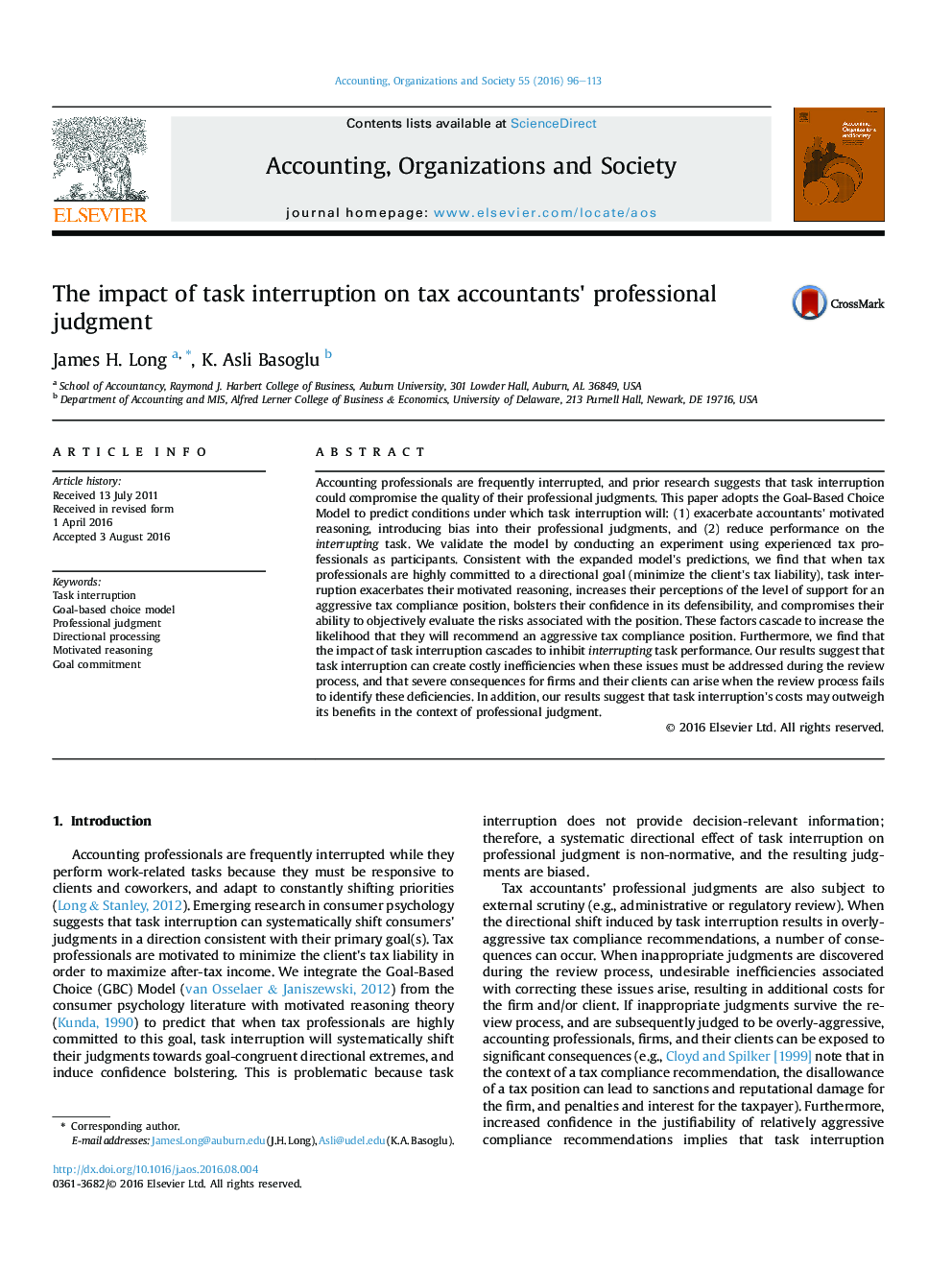| کد مقاله | کد نشریه | سال انتشار | مقاله انگلیسی | نسخه تمام متن |
|---|---|---|---|---|
| 5033327 | 1471243 | 2016 | 18 صفحه PDF | دانلود رایگان |
عنوان انگلیسی مقاله ISI
The impact of task interruption on tax accountants' professional judgment
ترجمه فارسی عنوان
تأثیر وقفه کار بر قضاوت حرفه ای حسابداران مالیاتی
دانلود مقاله + سفارش ترجمه
دانلود مقاله ISI انگلیسی
رایگان برای ایرانیان
کلمات کلیدی
وقفه وظیفه، مدل انتخاب مبتنی بر هدف، قضاوت حرفه ای، پردازش جهت، استدلال انگیزشی تعهد هدف،
ترجمه چکیده
حرفه ای های حسابداری اغلب قطع می شوند و تحقیقات پیشین نشان می دهد که وقفه کار می تواند کیفیت تصمیمات حرفه ای خود را به خطر بیندازد. در این مقاله مدل انتخاب انتخابی مبتنی بر هدف برای پیش بینی شرایطی که وقفه وظیفه را برطرف می کند: (1) استدلال انگیزه حسابداران را تشدید می کند، تعصب را در قضاوت های حرفهای خود به وجود می آورد و (2) عملکرد را در کار قطع می کند. ما مدل را با انجام یک آزمایش با استفاده از متخصصان مالی با تجربه به عنوان شرکت کنندگان تایید کردیم. مطابق با پیش بینی های مدل گسترده، متوجه می شویم که وقتی متخصصین مالیاتی به اهداف هدایت شده (حداقل بدهی مالیاتی مشتریان) متعهد می شوند، قطع کارها دغدغه های انگیزشی آنها را افزایش می دهد، ادراکات خود را نسبت به میزان حمایت از موقعیت تطابق مالیات تهاجمی افزایش می دهد، اعتماد به نفس خود را در دفاع از خود تقویت می کند و توانایی خود را برای ارزیابی خطرات مرتبط با موقعیت را به خطر می اندازد. این عوامل برای افزایش احتمال احتمال افزایش مالیات بر تعهدات مالیاتی، افزایش می یابد. علاوه بر این، می بینیم که تاثیر آبشارهای وقفه کار برای جلوگیری از عملکرد کار قطع. نتایج ما نشان می دهد که وقفه کار می تواند ناکارایی های گران قیمت را ایجاد کند، زمانی که این مسائل باید در طی فرایند بررسی مورد توجه قرار گیرد و پیامدهای شدیدی برای شرکت ها و مشتریان آنها می تواند زمانی رخ دهد که فرایند بازنگری نتواند این کمبودها را شناسایی کند. علاوه بر این، نتایج ما نشان می دهد که هزینه های وقفه کار ممکن است در زمینه قضاوت حرفه ای از مزایای آن فراتر رود.
موضوعات مرتبط
علوم انسانی و اجتماعی
مدیریت، کسب و کار و حسابداری
حسابداری
چکیده انگلیسی
Accounting professionals are frequently interrupted, and prior research suggests that task interruption could compromise the quality of their professional judgments. This paper adopts the Goal-Based Choice Model to predict conditions under which task interruption will: (1) exacerbate accountants' motivated reasoning, introducing bias into their professional judgments, and (2) reduce performance on the interrupting task. We validate the model by conducting an experiment using experienced tax professionals as participants. Consistent with the expanded model's predictions, we find that when tax professionals are highly committed to a directional goal (minimize the client's tax liability), task interruption exacerbates their motivated reasoning, increases their perceptions of the level of support for an aggressive tax compliance position, bolsters their confidence in its defensibility, and compromises their ability to objectively evaluate the risks associated with the position. These factors cascade to increase the likelihood that they will recommend an aggressive tax compliance position. Furthermore, we find that the impact of task interruption cascades to inhibit interrupting task performance. Our results suggest that task interruption can create costly inefficiencies when these issues must be addressed during the review process, and that severe consequences for firms and their clients can arise when the review process fails to identify these deficiencies. In addition, our results suggest that task interruption's costs may outweigh its benefits in the context of professional judgment.
ناشر
Database: Elsevier - ScienceDirect (ساینس دایرکت)
Journal: Accounting, Organizations and Society - Volume 55, November 2016, Pages 96-113
Journal: Accounting, Organizations and Society - Volume 55, November 2016, Pages 96-113
نویسندگان
James H. Long, K. Asli Basoglu,
